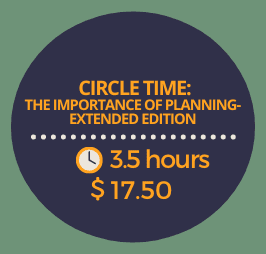
Circle Time: The Importance of Planning – Extended Edition
If you are employed in a state that uses a registry to track professional development hours, you will be able to provide your registry ID (Stars, MOPID, Registry or other ECE ID#) after you have completed the quiz for the course. If you pass the quiz we will report your course completion to the state registry using the registry ID that you provide.
Circle time is a part of most early childhood professional’s days. This course will help those new to the field learn the basics as well as bringing new ideas to those with experience. The course covers all of the information from the two hour circle time course and more!
Circle time and small group time should be fun and flexible while having a routine that the children can predict and count on. There are many possible elements and it’s important to include the ones that are right for your particular group. Don’t feel required to include anything that isn’t right for you and don’t be afraid to include things that may not seem traditional. Let’s explore! Course length – 3.5 hours
This course answers the following questions:
Should every classroom do circle time every day?
What elements need to be included in circle time?
Should circle time be the same each day?
How can I be flexible and yet keep with my routine?
What are some ways to keep the children’s attention during circle time?
How do I transition into circle time?
When is the best time of day for circle time?
Should I introduce a foreign language in circle time?
Do I have to do weather and calendar?
Participants who successfully complete this course will be able to:
Demonstrate an understanding of the importance of small group times.
Utilize the knowledge of multiple possibilities for components that may make their circle times more effective.
Create a new method of preparing for circle time in order to achieve better results.